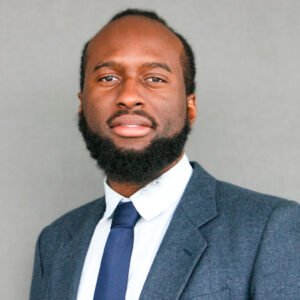A Helping Hand
By Bryan Hay
Dr. Mosi London ’10 still remembers how much he gained from his immersive experience in the externship program at Lafayette College, which brings sophomores, juniors, and seniors into project environments alongside professionals and graduate students.

Dr. Mosi London ’10
“The biggest thing with the externship program is that it exposes you to the workforce in a short but an effective amount of time,” says London (civil and environmental engineering), who did his externship at Walden Associates in Oyster Bay, N.Y., developing site remediation plans for gasoline stations, public swimming pools, and sanitation departments.
“You get a lot of information and experience, often in less than a week,” he says, recalling how he was exposed to an array of environmental mitigation and remediation issues, from methane releases to leaking gasoline storage tanks.
“I was able to go on site visits, be in meetings with clients, as well as view reports and documents,” says London, transportation planning project manager at AECOM, a multinational infrastructure consulting firm. “It was definitely a formative experience.”
Mindful of the valuable experiences he gained as an extern, he’s returned the favor for current Lafayette students.
Most recently, London worked with Jerri Norman ’22 on her honors project with Arthur Kney, professor of civil and environmental engineering and acting department head. Their work focused on how COVID-19 has affected public transportation, essential workers, and policy implementation.
“I started looking at the top public transportation hubs in the United States,” Norman says. “And so that kind of narrowed everything down to just looking at specific cities to see how those cities handled transportation policy and policy in general during the early months of COVID-19, and how that may have affected people in the long run.
“Like most researchers studying the impacts of COVID-19, there is a lot that we didn’t know at the start,” London says. “However, through the literature review of surveys and reports, and analysis of transit and traffic data as well as morbidity and mortality rates, we gained a better understanding of the varying degree of impacts across the United States, and, even more importantly, the possible reasoning to why those differences exist.”
Norman’s research is just one example of the rigorous academic programs at Lafayette, London says.
“I think it’s easy to be in a bubble and not see how the work that you’re doing is translating, in terms of opportunities in the future,” he adds. “I think most alumni would agree that we really didn’t realize the value of a Lafayette education degree until we left and entered the workforce.”
It’s important for alumni to think back when they were in that position, perhaps struggling or unsure about the future, and consider supporting externships, London notes.
As the only African American in his class of civil engineers, he also recognizes an even more urgent need to support students, especially students of color.
“Being a student of color comes with its own unique struggles,” London says. “Especially over the last year, I can’t imagine what it was like to deal with the pandemic, the Black Lives Matter movement, and everything else that’s been going on. Supporting the externship program is needed now more than ever.”
“In addition to Dr. London’s help with the methodology of data acquisition, working with an alumnus of his stature was helpful for career guidance and mentorship,” Norman says. “These kinds of opportunities help students prepare for their future. Lafayette engineering professors/advisers push you to be the best version of yourself through guidance and resources that ready you to pursue your career goals and aspirations.”
London compares alumni who support current students to parents, who always want their children to do better and be smarter, stronger, and more resilient.
“That’s my hope in helping young engineers at Lafayette, so they can better navigate the issues I struggled with and overcame with the help of others,” he says.